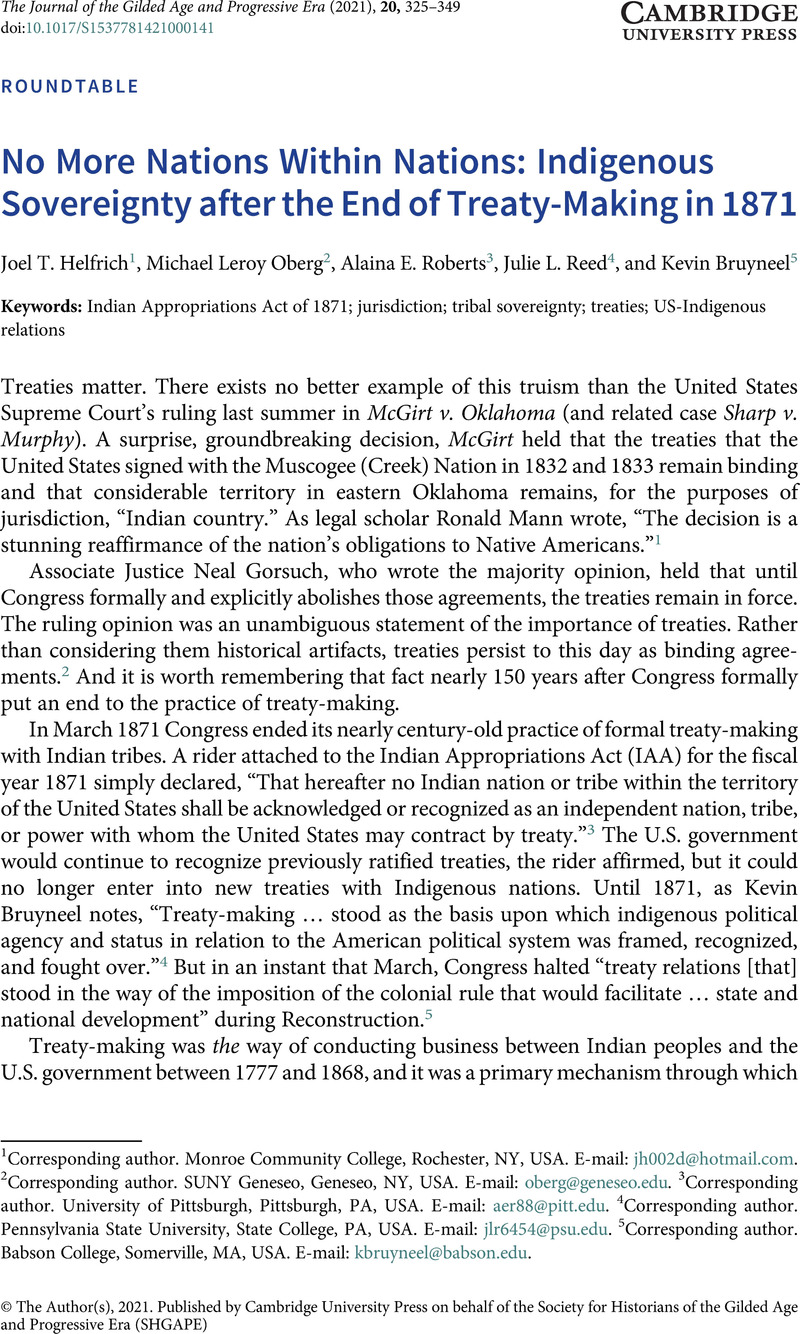No CrossRef data available.
Article contents
What Are the Costs of “Civilization” and Sovereignty?
Published online by Cambridge University Press: 22 April 2021
Abstract

- Type
- Roundtable
- Information
- The Journal of the Gilded Age and Progressive Era , Volume 20 , Issue 2 , April 2021 , pp. 340 - 343
- Copyright
- © The Author(s), 2021. Published by Cambridge University Press on behalf of the Society for Historians of the Gilded Age and Progressive Era (SHGAPE)
References
Notes
1 Denson, Andrew, Demanding the Cherokee Nation: Indian Autonomy and American Culture, 1830–1900 (Lincoln: University of Nebraska, 2015), 89–120.Google Scholar
2 McLoughlin, William G., After the Trail of Tears: The Cherokees’ Struggle for Sovereignty, 1839–1880, 1st ed. (Chapel Hill: University of North Carolina Press, 1994), 219–40.Google Scholar
3 Reed, Julie L., Serving the Nation: Cherokee Sovereignty and Social Welfare, 1800–1907 (Norman: University of Oklahoma Press, 2016).Google Scholar
4 Denson, Demanding the Cherokee Nation, 113.
5 Ezra Rosser, “The Nature of Representation: The Cherokee Right to a Congressional Delegate,” Boston University Public Interest Law Journal (2005), https://digitalcommons.wcl.american.edu/facsch_lawrev/473 (accessed July 16, 2020).
6 Denson, Demanding the Cherokee Nation.
7 “Timber Monopoly and the Revenue,” Cherokee Advocate, Aug. 24, 1881; “Report of the Dawes Commission Analyzed and Statement Sharply Controverted,” Cherokee Advocate, Feb. 20, 1895; “Our Western Lands,” Cherokee Advocate, Mar. 24, 1882; “Multiple News Items,” Cherokee Advocate, July 27, 1881.
8 “Timber Monopoly and the Revenue.”
9 “From the Globe Democrat,” Cherokee Advocate, Jan. 6, 1882.
10 Merrill Edwards Gates, Land and Law as Agents in Educating Indians: An Address Delivered Before the American Social Science Association at Saratoga, N.Y., Sept. 11th, 1885 (1885).
11 Talton v. Mayes, 163 U.S. 376 (1898), https://supreme.justia.com/cases/federal/us/163/376/ (accessed July 16, 2020).
12 Leeds, Stacy L., “Defeat or Mixed Blessing—Tribal Sovereignty and the State of Sequoyah,” Tulsa Law Review 43:1 (Fall 2007): 5–16; “State of Sequoyah,” https://www.loc.gov/item/2013592417/ (accessed July 16, 2020).Google Scholar
13 McGirt v. Oklahoma, 591 U.S. ___ (2020), https://supreme.justia.com/cases/federal/us/591/18-9526/ (accessed July 16, 2020).


